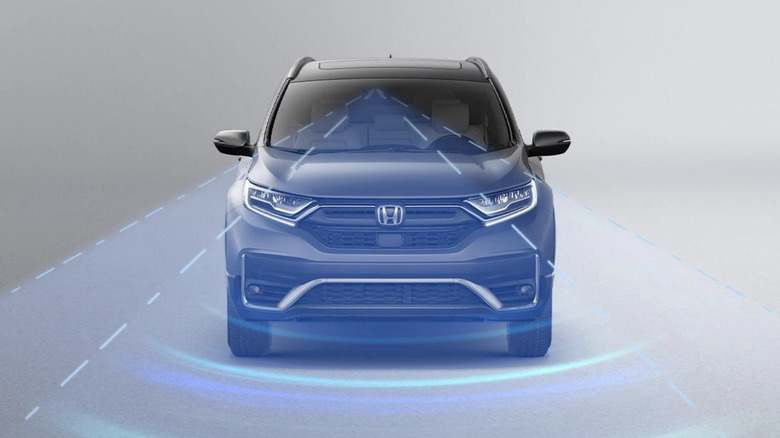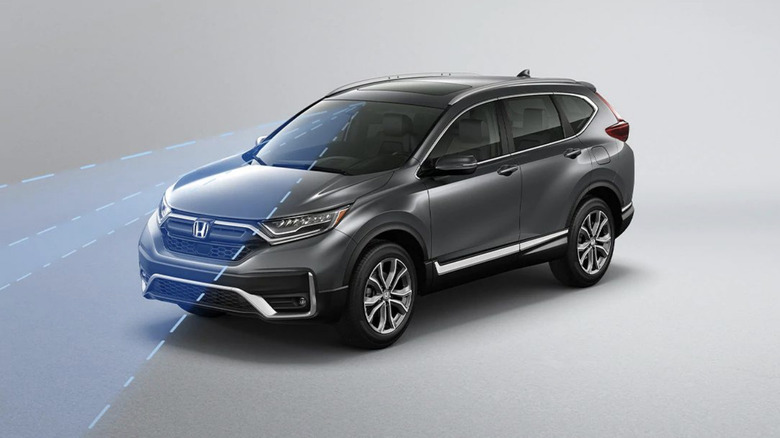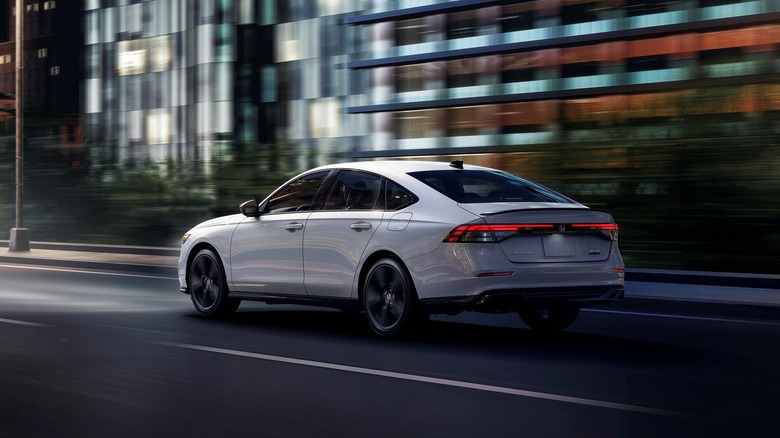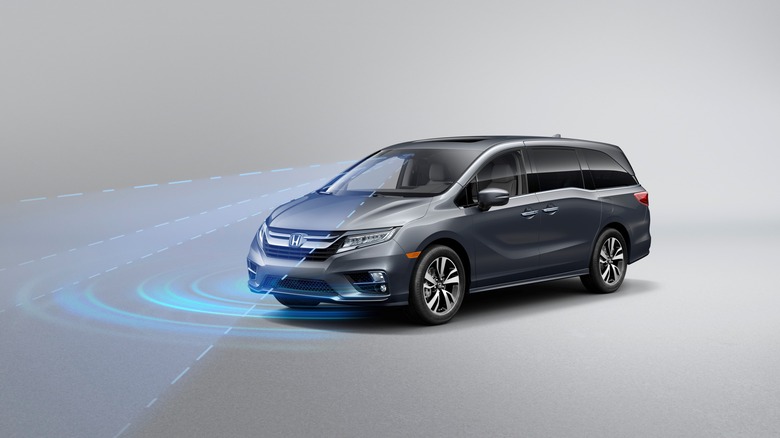Honda Sensing: What Does It Do And Which Models Have The Feature?
When you're driving, your attention should be fully on your vehicle, the road, and the traffic around you. However, we all know that's not always the case. Distractions come in many forms, whether it's talking on the phone, adjusting the GPS, or trying to get a quick sip of your coffee while you're on the move. But the thing is, distracted drivers are dangerous to everyone on the road. While multitasking might feel convenient, it only increases the risk of an accident. In fact, according to a report, in 2022 alone, distracted driving caused more than 3,300 deaths.
However, both the government and carmakers are stepping in to address this issue. In 29 states, it's now illegal to use a hand-held cell phone while driving, and more policies are being put in place to protect road users. Meanwhile, automakers are introducing solutions to make driving safer. One company leading the charge is Honda, which has always prioritized driver safety and given consumers a stock of reliable models over the years. In 2014, Honda introduced a suite of advanced safety technologies known as Honda Sensing. But what exactly is Honda Sensing? And with it being standard in newer models, how does it help keep you safe on the road?
Honda Sensing makes driving safer and easier
Driving requires your full attention. However, it's still pretty easy to miss something and make a mistake. That's where Honda's advanced safety features come in. With multi-angle cameras and sensors, these features monitor your surroundings and help improve your driving experience.
There are small cameras capable of recognizing and notifying you about the speed limits. If a car is in your blind spot while your turn signal is on, the Blind Spot Information System will warn you with a beep and a blinking light. Even when you're switching lanes with Honda LaneWatch, you don't have to rely on the mirrors alone because the camera on your passenger side mirror will transmit a clearer view of the lane to the dashboard.
Of course, you should always remain alert when driving. Let's say, for some reason, you momentarily begin to drift out of your lane without signaling, The Road Departure Mitigation System will gently adjust your steering to bring you back on track so you don't veer off the road. With Adaptive Cruise Control, your car can maintain a safe following distance from the car ahead. When you get too close to another vehicle or object, a proprietary emergency braking system automatically applies brake pressure and gives you a better chance of avoiding a collision.
If driving at night makes you nervous, well, you're not alone — several other drivers feel the same way. While there are general tips to make night driving safer, Honda offers features that can help, too. One of them is Auto High-Beam Headlights, which automatically switch between low and high beams depending on the situation. This allows you to focus on the road ahead without blinding other oncoming vehicles.
Which models have Honda Sensing?
Honda Sensing made its debut with the 2015 Honda CR-V Touring model and has been standard in every new Honda model ever since, except the base trim of the 2021 HR-V SUV. Some of the more advanced safety features, like the Blind Spot Information System, may only available in higher trims, meaning the assortment of safety features you get depend on the model and trim level. Unfortunately, if your model or trim doesn't come equipped with the Blind Spot Information System, you won't be able to add it later at the dealership.
Even with these features, it's important to remember that they don't make your Honda an autonomous vehicle. They're assistive technologies designed to keep you alert and help you notice details you might otherwise miss. As we discussed earlier, Honda remains fully committed to prioritizing driver safety. In 2021, Honda's CEO, Toshihiro Mibe, announced that the company plans to achieve zero traffic collision fatalities involving Honda vehicles by 2050. To support this vision, Honda has been pushing the boundaries of safety technology, introducing the Honda Sensing Elite and Honda Sensing 360.
The next generation of Honda Sensing
Honda first launched the Honda Sensing Elite in its Japanese models in 2021. This system builds on traditional advanced driver assistance systems (ADAS) by integrating artificial intelligence (AI), allowing for Level 3 autonomy. This means the vehicle can handle hands-free driving in certain conditions, such as in heavy traffic, but the driver still needs to be ready to take over when necessary.
Looking ahead, Honda is working on the next generation of Sensing Elite, which will lean even more on AI. This upgraded version will go beyond just hands-free driving. It will manage tasks like automatic parking and even pulling the car out of a garage. Although Honda hasn't provided a specific release date, it promises that this AI will continually improve, learning from real-world experiences to become smarter and more intuitive over time.
While the Honda Sensing Elite hasn't made its way to the U.S. yet and might not for some time, Honda has a clear plan in place. By 2030, Honda Sensing 360, a system focused on enhanced collision avoidance and improved blind-spot monitoring, will become standard across all U.S. Honda models. This system uses radar and cameras to expand the car's field of vision. Its main function is to detect abnormal conditions around the vehicle or from the driver and step in to prevent collisions before they occur.
If the driver becomes unresponsive while in hands-free driving mode, the system takes control. After issuing repeated warnings, the vehicle will automatically flash its lights, honk its horn, and ultimately bring itself to a controlled stop in its lane. In summary, Honda's safety vision goes beyond just keeping you alert. The company is actively working toward a future where accidents can be avoided altogether.



